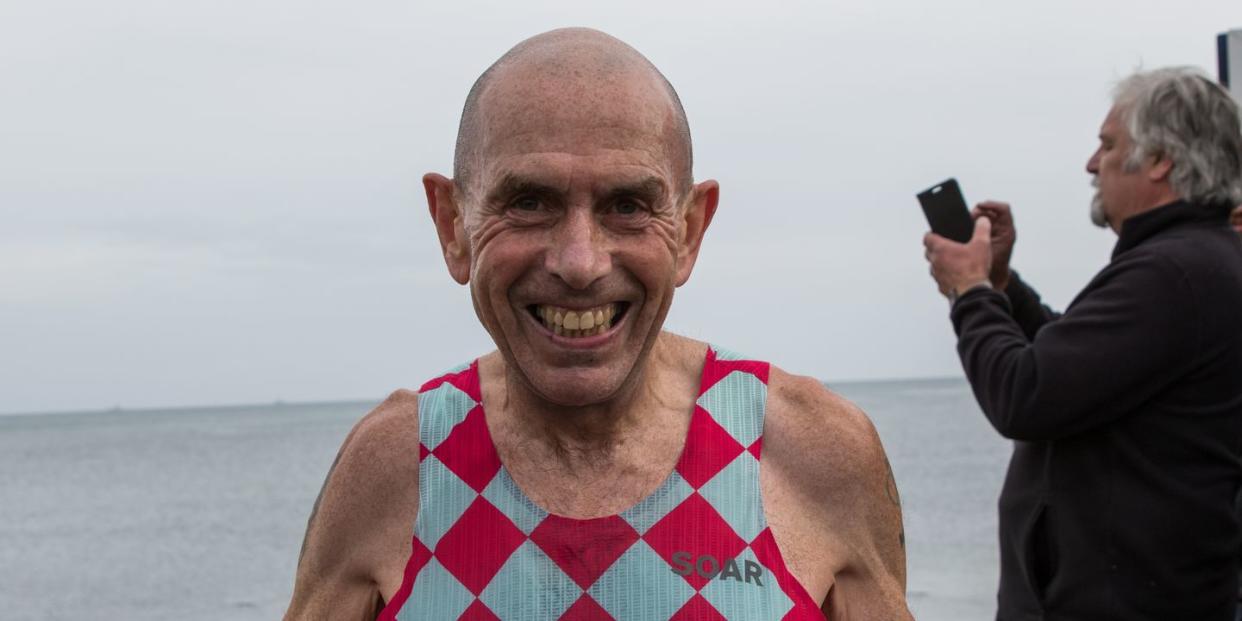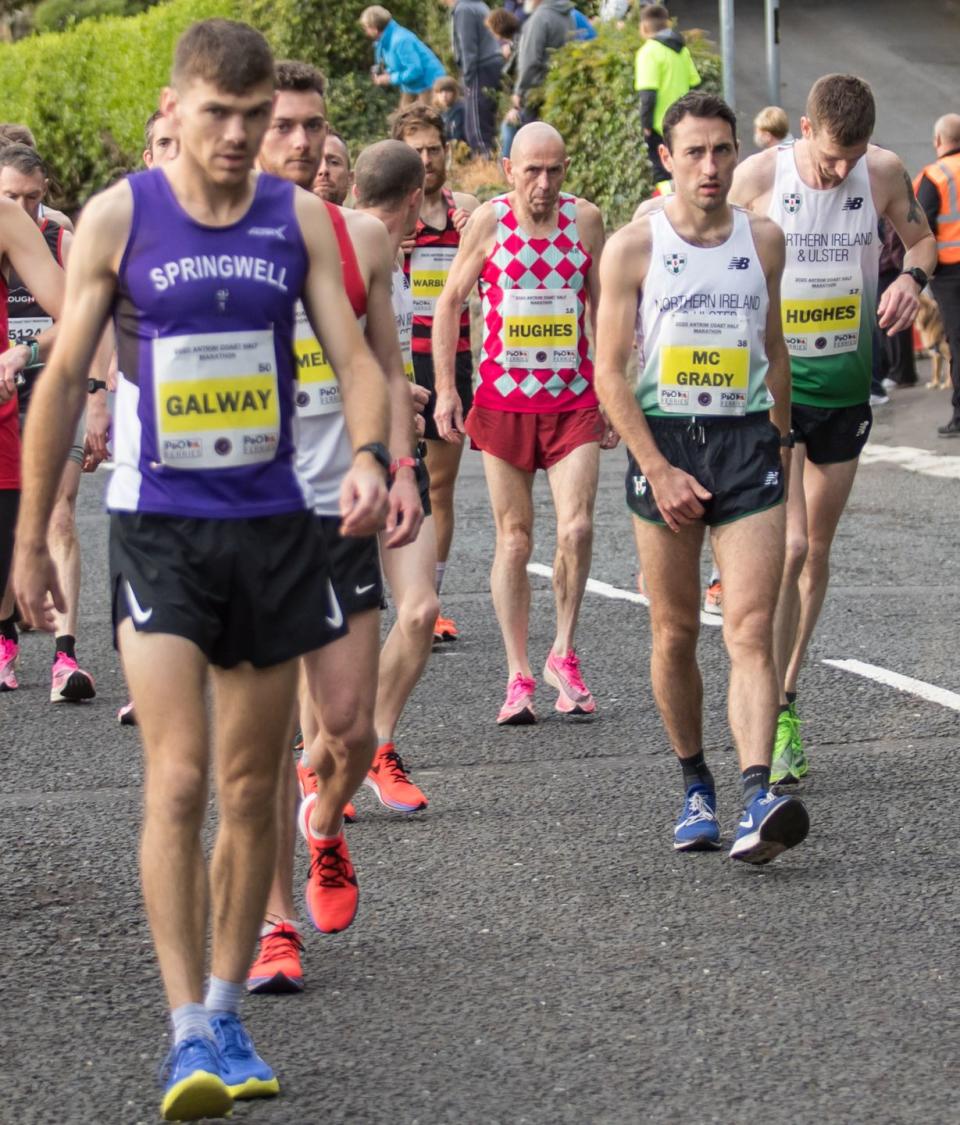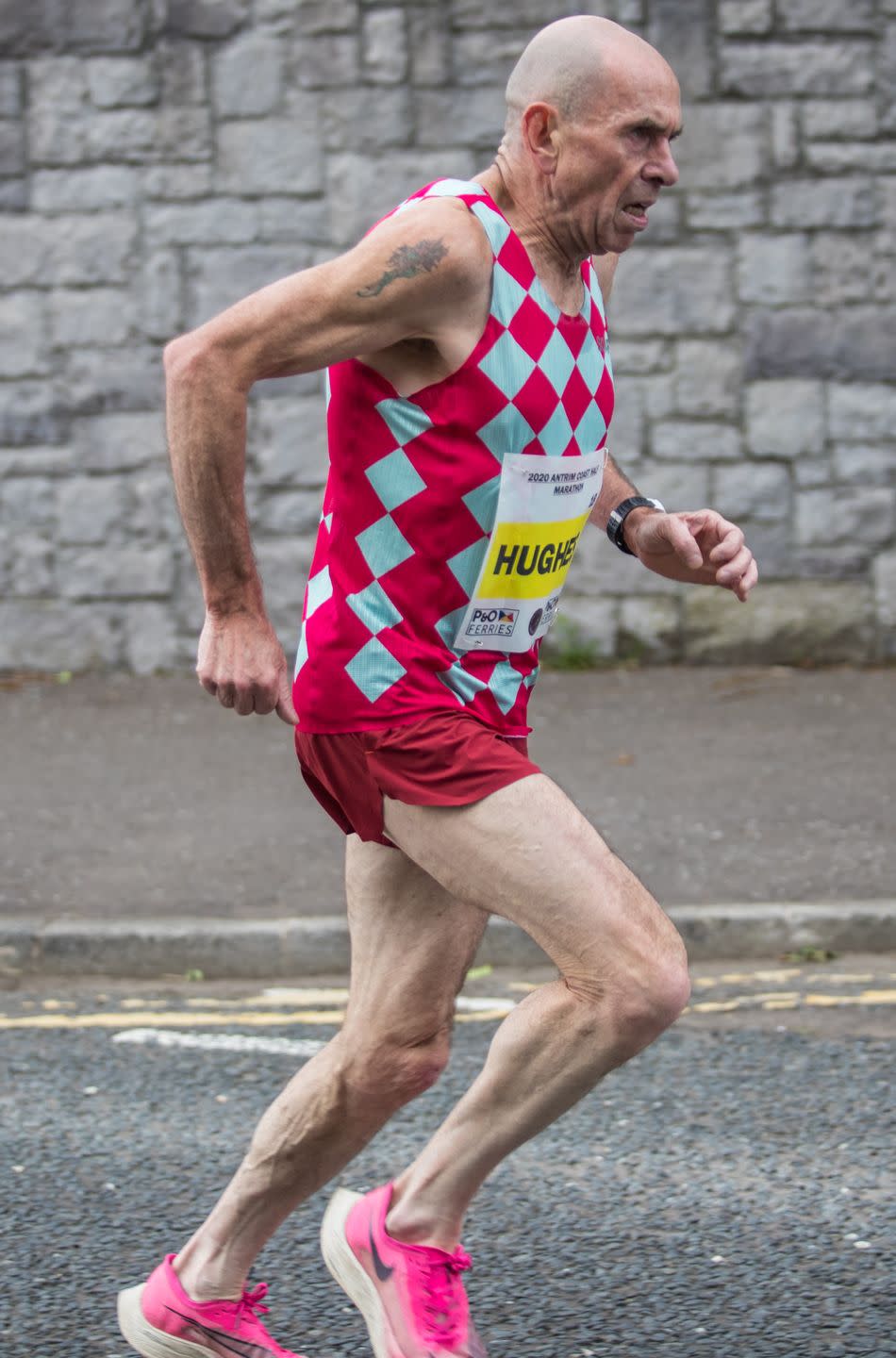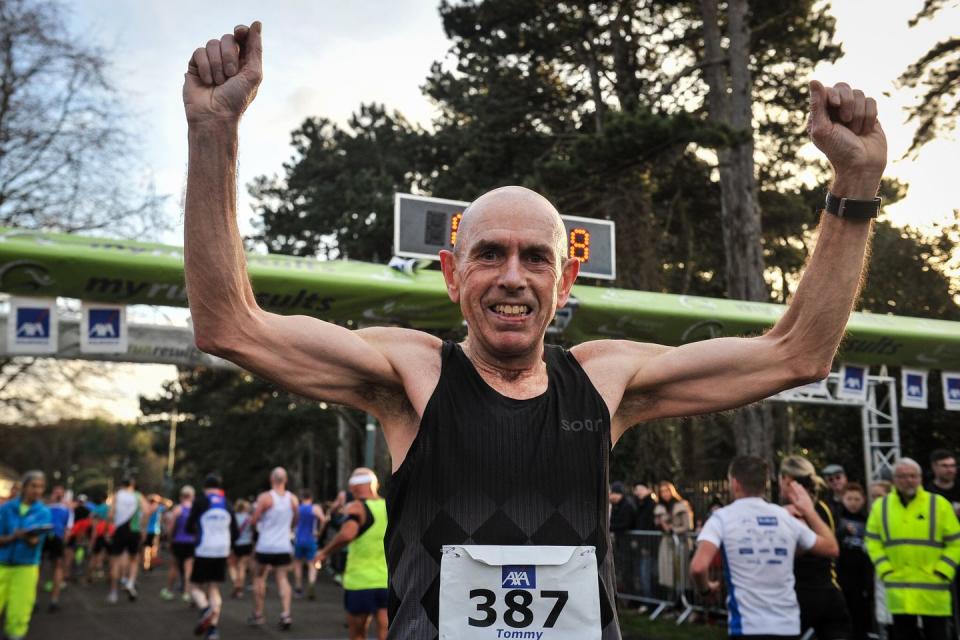Alcohol nearly killed Tommy Hughes. Now he's shattering masters records

When he saw the clock at the finish, Tommy Hughes began to sprint. The 60-year-old pumped his arms, drove his legs, and ran the last 100 meters like his life depended on it.
Soon after he crossed the line, he got the good news: Hughes had carved 22 seconds off the over-60s half marathon world record, clocking 1:11:09 at the Antrim Coast Half Marathon–an average of 5:26 a mile—in Northern Ireland on Saturday, September 12.
That night, he celebrated with a pizza. The next morning, he ran 21 miles.
At the age of 60, the times he can run are astonishing. But if there’s one thing that stretches the credulity of his tale, it’s that Hughes is still around to tell it. Because in order to live this life, he had to go right to the brink of death.
'Without running, I could’ve been six feet under,' he says. 'It kept me on this planet.'
Hughes is many things: An Olympian, a father of four, an electrician. He’s also a recovering alcoholic, and he has no fear admitting the depths to which he once sank.
'I near killed myself,' he says.
To understand the journey to such lows, it’s best to begin with the highs: Estadi Olimpic, Barcelona, August 1992. Hughes ran 2:13:59 at the Marrakesh Marathon in Morocco, which qualified him to represent Ireland in those Olympics, but a stress fracture in his foot significantly hobbled him.
The men’s marathon was the last event of the ’92 Games, and because of the closing ceremony taking place that Sunday night, anyone with a finishing time longer than 2:45 was redirected to a finish outside the stadium. As he soldiered around those streets, he was driven by one thought: he was determined to not finish outside the stadium.
'I was pushing to get into the Olympic stadium with the packed crowds, the big screens.' And Hughes did, finishing 72nd in 2:32:55. 'I was totally overjoyed.'
For most of his life, Hughes was the last guy you’d expect to become an Olympian. After getting married at 21 years old, he moved to Maghera, Northern Ireland, a small parish in County Down, where he began 'piling on the pounds.'
To counteract that, he joined the local Gaelic football club, and went for runs on his own to shed some weight. In doing so, he unearthed an ability that had lain dormant his whole life.
At 23, he gave the Belfast Marathon a go, but struggled after 20 miles, coming home in 3:01.
'Running that time kept me going because then I wanted to break three [hours],' he says. 'The All-Ireland marathon was in Letterkenny after that, I ran 2:35 and thought, "There’s something there to be pursued."'
He won the 1991 Dublin Marathon in 2:14:46, but the following February, six months before the Olympics, he injured his foot midway through a five-mile run. But Hughes didn’t stop running.
'I limped on. It’s an addiction people get, the same as smoking. You can’t help going on.'
While he 'loved every minute' of the Barcelona Games, he soon stepped into a void that is familiar to many Olympians: 'In my head I’d reached the pinnacle. After that I lost motivation.'
After the Barcelona Games, he trained in stop-start fashion, with his career as an electrician taking priority. Hughes won the Belfast Marathon in 1988 and ’98, so in 2008 he figured he’d give it another go. He finished sixth in 2:28:38 at the age of 48.
But in his early 50s, he noticed a troubling trend: A series of sporadic mood swings, his mind taking him to progressively darker places.
'I was getting into bouts of really bad depression, and I started drinking heavily. I’d go drinking for a couple of weeks then get my head together and start training, but the mood swings would come back. It was getting worse as years went on and then I went for three months–drinking.'

On weeks when he was working, he’d sink a full bottle of vodka every night, then drag himself out of bed the next morning. When he wasn’t working, things became even more dangerous.
Hughes credits his partner, Anne, for forcing him to face his demons and standing by him through the really bad times, 'when any other person would give up,' he says.
'I’d go on absolute binges for weeks until I hit rock bottom, then I’d shake myself down and start building up again. I kept saying to my partner, "If I could bottle the withdrawal symptoms and remember it, then I wouldn’t drink again" because I’d go through too much pain.'
After one really bad episode, she took him to the local medical centre—which was a turning point for Hughes. A blood test turned up extremely high levels of calcium in Hughes’s bloodstream, which was caused by hyperparathyroidism.
'My parathyroid gland was taking calcium from my bones and pumping it straight into my bloodstream. If it hadn’t been detected, in years to come my bones would have become brittle, and I wouldn’t have been able to walk. Drinking was the blessing in disguise to find that out.'
The clues began to add up, with his chronic fatigue and depression linking back to a faulty pea-sized gland in his neck. Hughes was told he could either take medication to control it for the rest of his life or undergo surgery to have the gland removed. He chose surgery, going under the knife in September 2018. Weeks later he was back racing, helping Ireland to team bronze in the half marathon at the World Masters Championships in Spain.
'From then things clicked,' he says. 'It got better and better.'

He continues to carve up the masters record books. At the Rotterdam Marathon last April, he ran 2:30:15, and in Frankfurt last October, he teamed up with his eldest son Eoin to become the fastest father-son marathoners of all time. Tommy ran an over-55s world record of 2:27:52, while Eoin clocked 2:31:30 for a combined time of 4:59:22.
'It’s the biggest achievement for me,' Tommy says. 'Bigger than the Olympics.'
His training hasn’t changed much over the years. When he’s building up for a marathon, he’ll run 120 miles a week; when he’s not, he’ll drop down to 60. His daily staple is 10 miles in the morning and 10 in the evening. On Sundays he’ll do a long run of 17 to 21 miles, and once a week, he’ll join in a track session with his club, Termoneeny Running. He doesn’t monitor his heart rate or his times, instead running by feel.
'If I feel I need a rest, I rest,' he says. 'I can’t be too regimental because you can over-train and be stale. But it’s great the body can still hold up to it; that’s what amazes me.'
He does regular strength sessions–'a bit of weights, sit-ups, core work'–and his diet is refreshingly old-school. He drinks sports drinks after long runs to replenish his electrolytes, and he doesn’t take supplements. 'It’s healthy foods; I don’t eat rubbish.'
And he hasn’t touched a drop of alcohol since 2018, which has left his body and his mind in a far better place.
'I’m not putting everyone associated with me through the pain of me spiralling downwards all the time,' he says. 'I wish I had done it earlier, but I can’t rewrite history. I have to look to the future.'
He never went down the therapy route, feeling he always held the keys to his own recovery.
'I’m very strong-willed and strong-minded. ... I decided, "That’s it, I have to stay on the straight and narrow." I haven’t got outside help other than my family rallying around me every time I hit the bottle.'
He’s aware addiction can be a shape-shifting scourge, fading out of one area of life before reappearing in another. He may be a running obsessive, but Hughes is keen to stress his relationship with the sport is a healthy one.
'People might think I’m addicted because they see me out training all the time,' he says. 'But I have a purpose, a goal.'
Next month he hopes to run under 2:30 at the Wrexham Marathon in Wales, which would make him the first man ever to do that in five separate decades. The over-60s marathon world record of 2:36:30 looks to be living on borrowed time.

Now in his seventh decade, Hughes builds his life around running the same way he did when training for the Olympics. For many years he worked 12 hours a day, seven days a week, as an electrician but now he just does occasional work for his daughter’s business.
He was recently offered a high-paying job in Finland, but Hughes weighed up how it would affect his training and decided to turn it down.
'You have to think: What is it I really want?' he says. 'I have enough money to pay the bills and I’m totally committed to running so I want to stick it out for the time being. I enjoy it, and that’s the main thing.'
You Might Also Like


